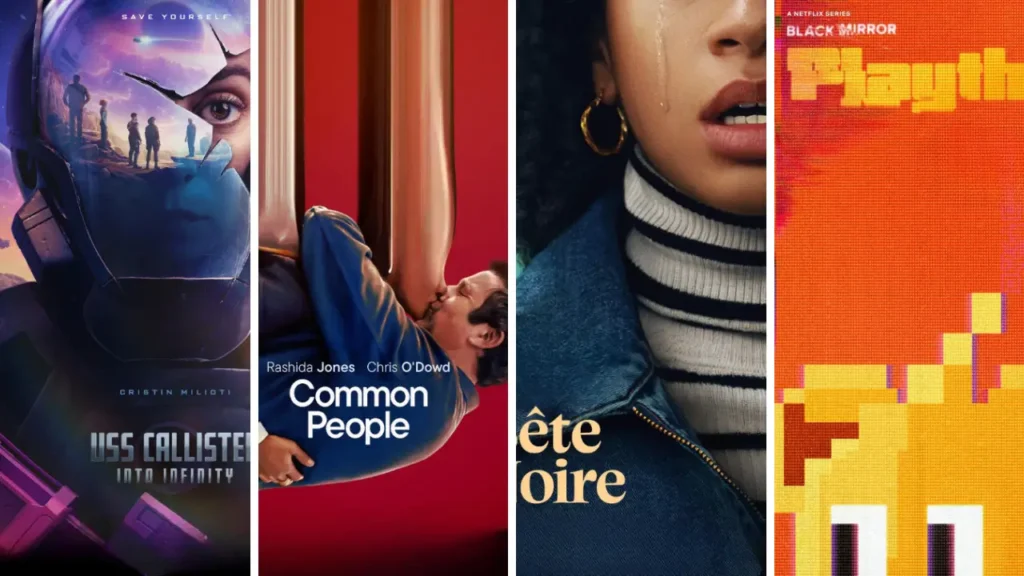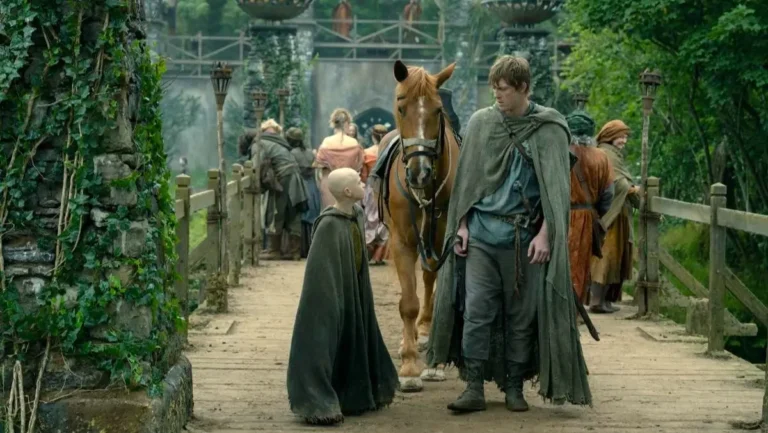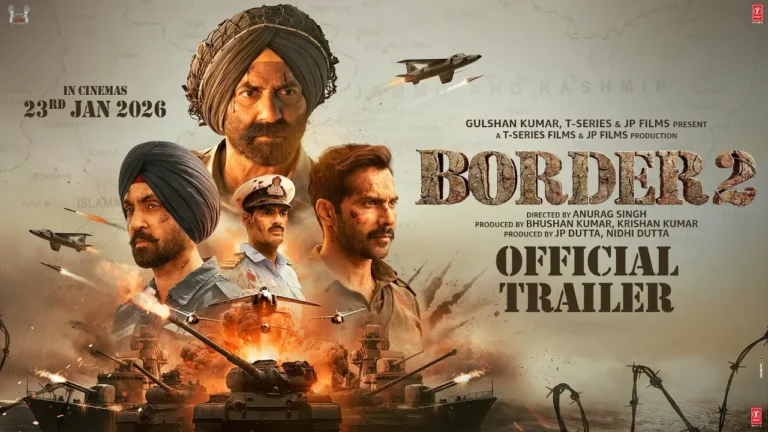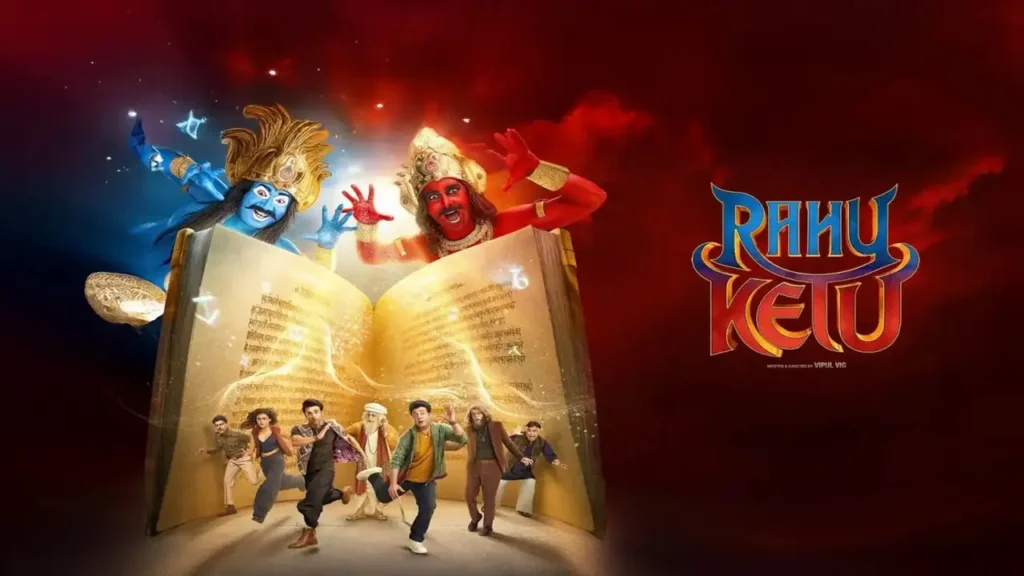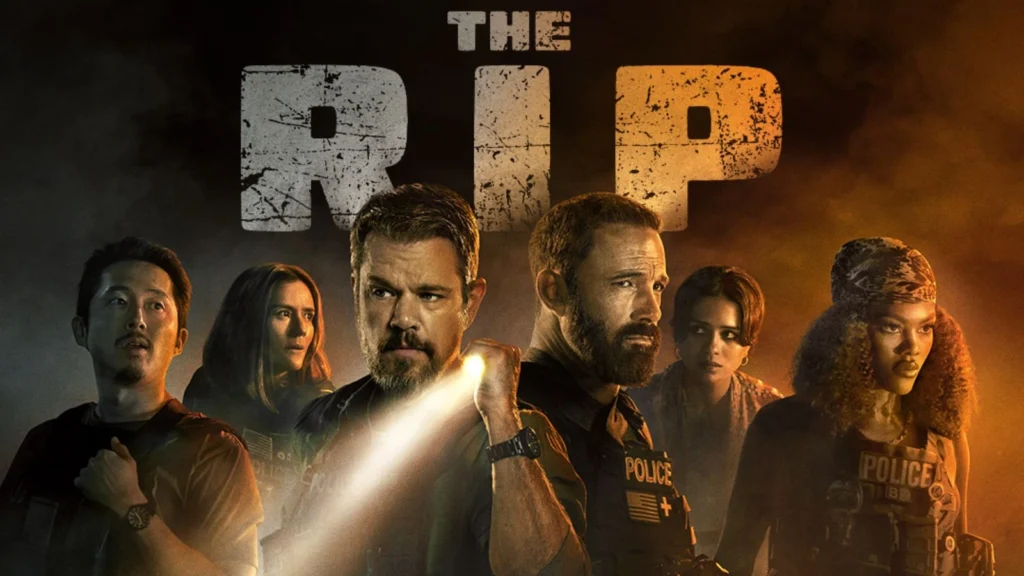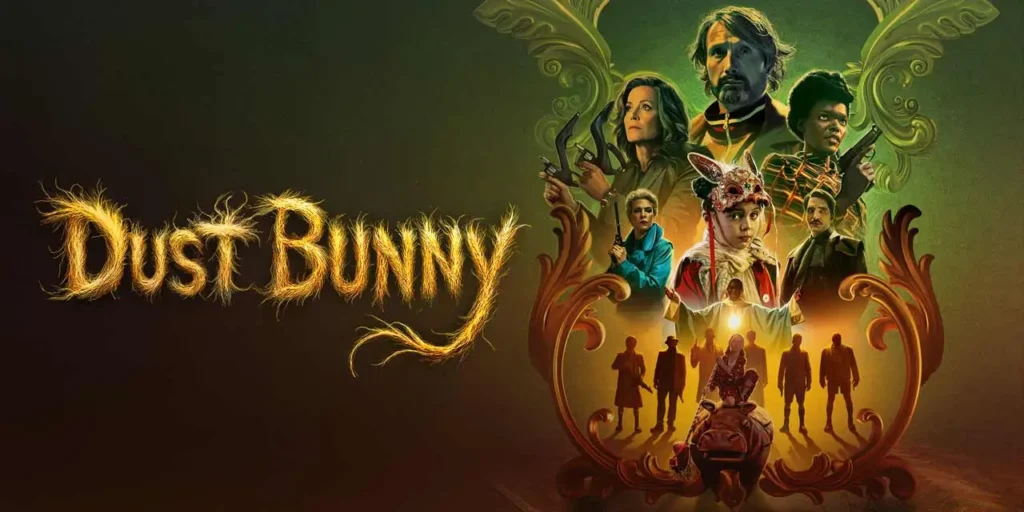So here we are, folks—Charlie Brooker is back, and Black Mirror has returned for its seventh season. And yes, it’s still as dark, twisted, and thought-provoking as ever. With six new episodes that range from emotionally gutting to absolutely unhinged, this season delivers exactly what we’ve come to expect from Black Mirror—but with a few surprises that tug more at the heart than the horror. lest dive into Black Mirror Season 7 Review>
Table of Contents
ToggleBlack Mirror – Season 7
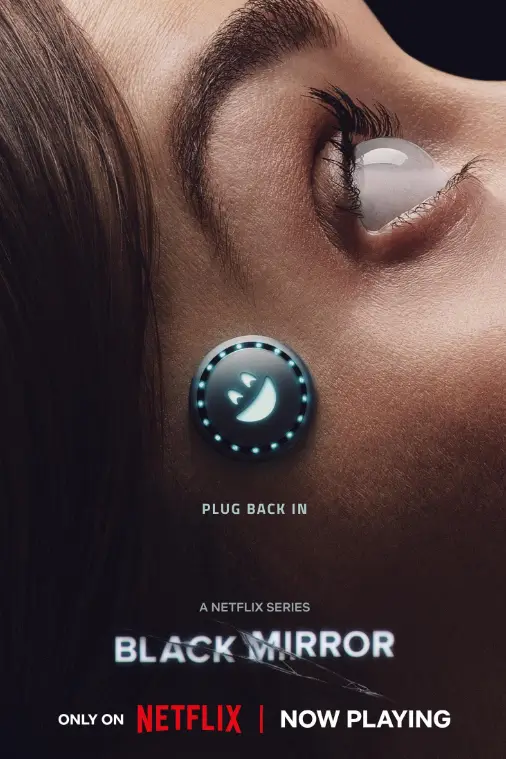
Rating: (4.5/5)
| Detail | Information |
|---|---|
| Genre | Anthology, Speculative Fiction, Science Fiction, Dystopia |
| Creator | Charlie Brooker |
| Original Language | English |
| Number of Series | 7 |
| Number of Episodes | 33 , (New Season – 6 Episodes) |
| Running Time | 40–89 minutes per episode |
| First Release Date | December 4, 2011 |
| Latest Release Date | April 10, 2025 |
A Quick Recap of What Black Mirror Stands For
- The Anthology Format: If you’re new to the series (first of all, welcome to the pain), Black Mirror is an anthology show. Each episode is a standalone story, usually set in a near-future dystopia ora twisted version of our present reality. There’s no chronological order, and you can watch episodes in any order. It’s kind of like if The Twilight Zone grew up, got cynical, and got obsessed with iPhones.
- Themes That Still Haunt Us: Black Mirror doesn’t just explore technology—it explores us. Our choices, our obsessions, our relationships. Whether it’s the ethics of cloning consciousness or the line between simulation and reality, the show always holds up a cracked mirror to society, showing us what we could become if we’re not careful.
Season 7 Overview
- A Star-Studded Cast: This season is loaded with talent—Paul Giamatti, Peter Capaldi, Rashida Jones, Chris O’Dowd, Cristin Milioti, Issa Rae, Awkwafina, Will Poulter—the list goes on. And guess what? Each one brings their A-game, delivering powerhouse performances in their unique, twisted little tales.
- Variety of Genres and Emotional Arcs: There’s everything from psychological horror to comedic sci-fi to a melancholic stage play about grief and memory. Black Mirror Season 7 is less about jump scares and more about emotional scars.
- The Balance Between Tech and Humanity: This season leans a bit more into the human side of the Black Mirror equation. Sure, there’s still creepy tech and insane virtual realities, but many stories hinge on deeply personal decisions—ones that could happen even without the futuristic devices.
Episode-Wise Breakdown
1. “Common People” — The Safe Bet
Starring: Chris O’Dowd, Rashida Jones, Tracee Ellis Ross
Vibe: Corporate healthcare hell meets marital unraveling
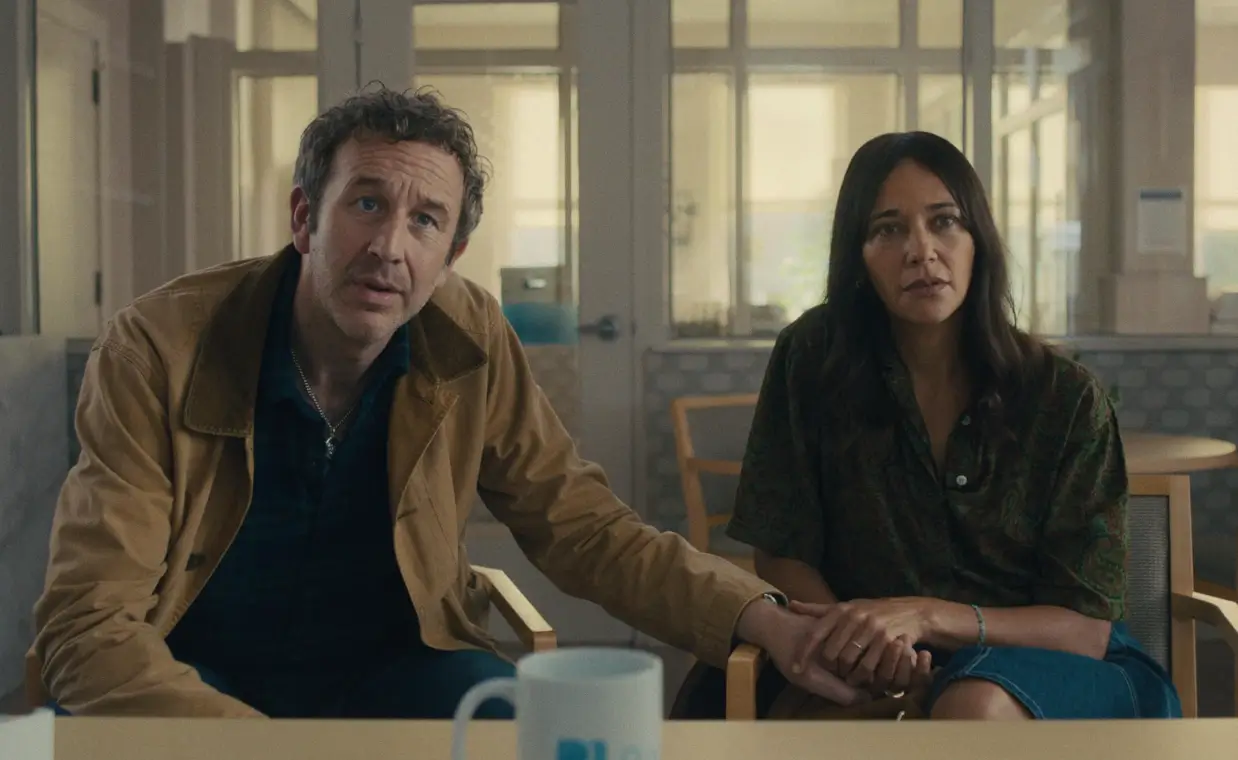
The season opener, starring Chris O’Dowd and Rashida Jones, might be the most traditional Black Mirror episode of the bunch. After a tragic accident, a couple is pushed into a morally murky medical experiment that spirals in predictably grim ways. The tech critique is sharp, the emotional stakes real, and the tone unmistakably familiar.
But something’s different. In earlier seasons, this story might have ended with a brutal gut punch or a damning moral. Instead, “Common People” gives its characters grace. Their choices are shaped not by selfishness but by desperation, and the show seems less interested in indicting them than in understanding them. It’s still compelling—but less punishing. The empathy dial has been turned up.
Why It Works: Classic Black Mirror setup—tech as a Faustian bargain—but with a gentler execution. Ten years ago, this would’ve ended in a moral abyss. Here, the focus shifts to human resilience amid systemic rot.
Missed Opportunity: Lacks the visceral “What have I just watched?!” twist we crave.
Rating: 4/5
2. “Bête Noire” — The Weak Link
Starring: Siena Kelly, Rosy McEwen
Vibe: Office paranoia meets high-school trauma

Siena Kelly shines as Maria, whose workplace is suddenly infiltrated by a mysterious woman from her past, Verity (Rosy McEwen). What begins as psychological suspense unravels into something more surreal, but the emotional and narrative stakes never quite land.
Despite strong performances and some intriguing ideas about memory, bullying, and reinvention, “Bête Noire” feels like a diluted echo of earlier episodes like “White Bear” or “Shut Up and Dance.” It wants to provoke but doesn’t commit. Brooker’s once-razor-sharp edge feels dulled here.
Why It Works: Tense performances and eerie cinematography amplify the paranoia.
Missed Opportunity: The premise—bullying, corporate sabotage—feels underexplored. A sharper script could’ve made this a modern “Playtest.”
Rating: 3/5
3. Hotel Reverie — The Wild Card
Starring: Issa Rae, Emma Corrin, Awkwafina
Vibe: Old Hollywood meets AI chaos
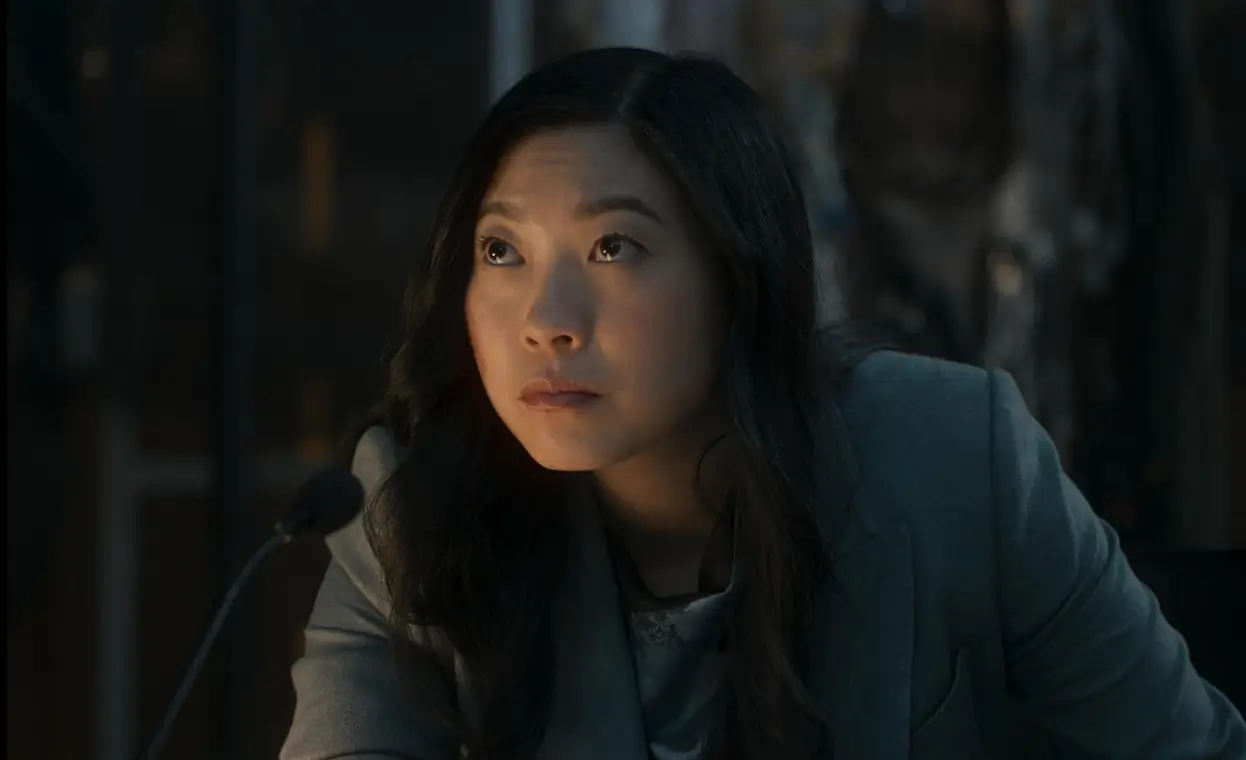
The season’s most chaotic entry, “Hotel Reverie,” takes a swing at Hollywood, AI, and the ethics of digitally resurrecting classic cinema. Awkwafina plays a tech exec who offers a legacy studio a too-good-to-be-true proposition: Remake a classic film with an AI simulation of its original cast—plus one new twist.
It’s messy, ambitious, and tonally jarring—equal parts satire, sci-fi, and emotional drama. Emma Corrin stands out as a digitally recreated 1940s starlet, breathing life into a script that doesn’t always know what it wants to be. Still, even when it stumbles, “Hotel Reverie” shows how Black Mirror is willing to experiment with genre and form in ways it once avoided.
Why It Works: A meta-commentary on Hollywood’s remake obsession, with Corrin stealing scenes as a silver-screen ghost.
Missed Opportunity: The tonal whiplash—comedy, drama, satire—never fully coheres.
Rating: 3.5/5
The Final Three: Where Black Mirror Finds Its Future
If the first half of the season is about self-reflection, the second half is about reinvention. Episodes 4 through 6 are easily the strongest and suggest a bold new path for the show.
4. “Plaything” — Retro Tech, Real Terror
Starring: Peter Capaldi, Will Poulter
Vibe: ’90s gaming nostalgia meets augmented reality horror

A spiritual sequel to Bandersnatch, “Plaything” is a genre-bending thriller that jumps between the 1990s and the near future. A shoplifter (Peter Capaldi) is detained in connection to an old murder, but the truth lies decades earlier, when he was a video game journalist obsessed with a long-lost title from Colin Ritman (Will Poulter).
Visually stylish and narratively twisty, “Plaything” blends retro gaming nostalgia with present-day paranoia. It’s a love letter to analog tech and a warning about how we process obsession, memory, and responsibility. This is Black Mirror at its most exciting: fast, weird, and emotionally grounded.
Why It Works: A love letter to retro gaming and Black Mirror’s own mythos. Capaldi’s manic energy is electric.
Missed Opportunity: The ending fizzles—more “Hang the DJ” than “White Christmas.”
Rating: 4/5
5. “Eulogy” — The Quiet Masterpiece
Starring: Paul Giamatti, Patsy Ferran
Vibe: Memory-as-therapy meets quiet devastation
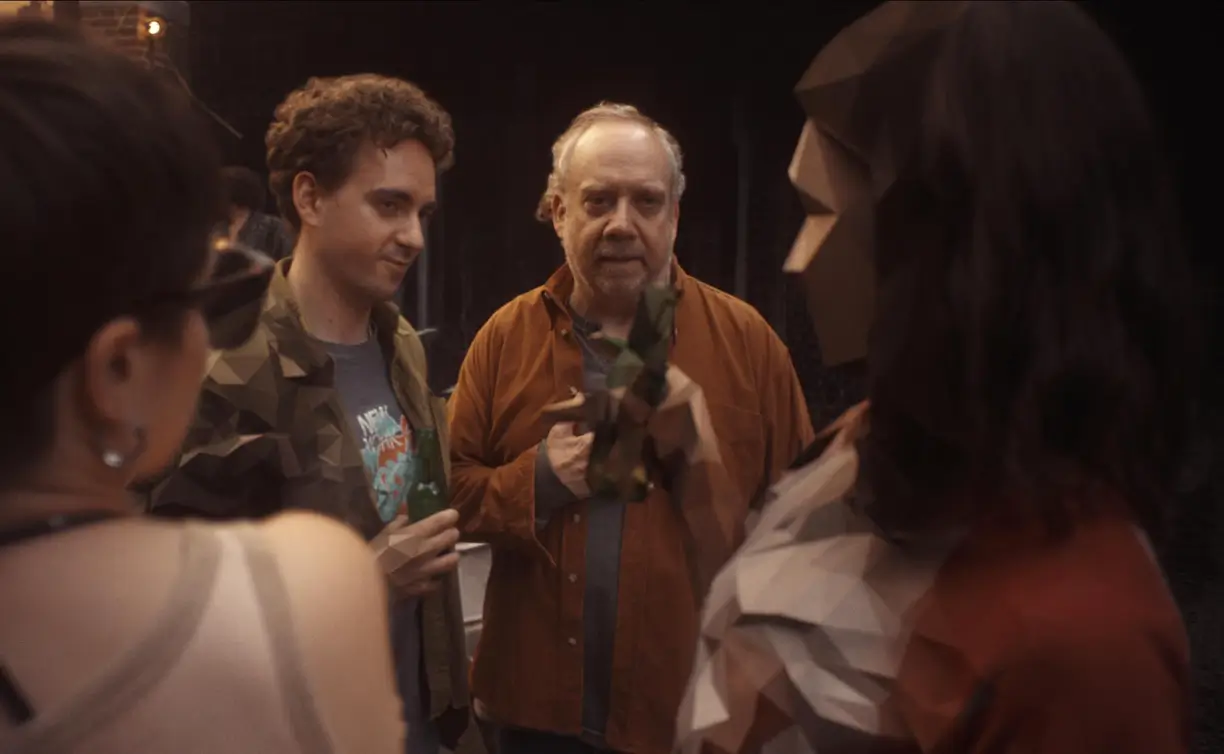
Paul Giamatti delivers a career-highlight performance as Phillip, a man asked to contribute to a high-tech memorial for a woman from his past—someone he’s tried very hard to forget. Guided by a digital assistant (Patsy Ferran), Phillip confronts a lifetime of buried regret.
“Eulogy” is less cautionary tale, more emotional reckoning. It’s gentle, meditative, and stripped down—just two voices and a cascade of memories. And it never once paints the tech as villainous. Instead, the tools of Black Mirror are used to heal, not harm. It’s a stunning episode and a reminder that emotional storytelling is just as vital as big ideas.
Why It Works: Giamatti delivers a career-best performance. The tech isn’t the villain—it’s a catalyst for healing. A seismic shift for the series.
Missed Opportunity: None. This is perfection.
Rating: 5/5
6. “USS Callister: Into Infinity” — The Sequel We Didn’t Know We Needed
Starring: Jesse Plemons, Cristin Milioti, Jimmi Simpson
Vibe: Star Trek camp meets corporate thriller
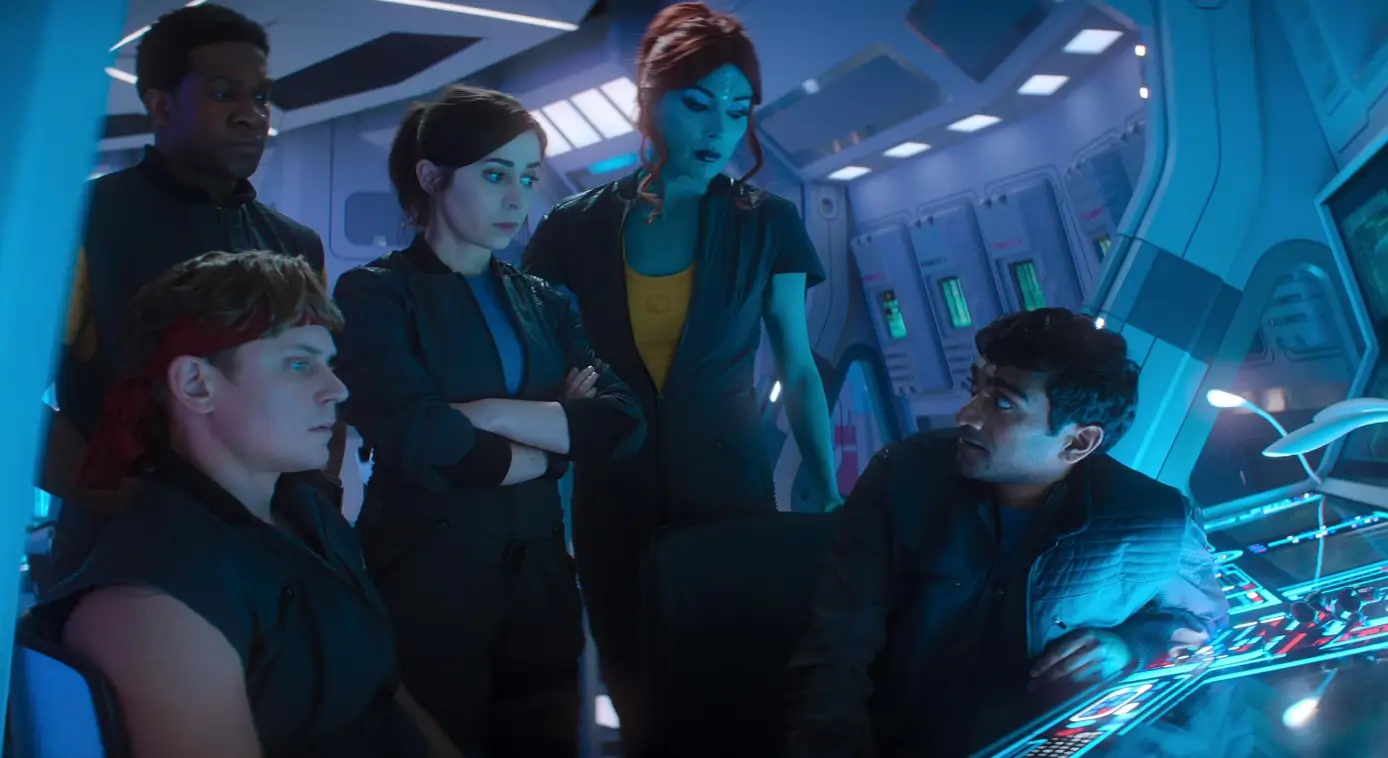
Revisiting one of the show’s most popular stories is a risky move, but “Into Infinity” sticks the landing. Picking up where “USS Callister” left off, the escaped digital clones roam free in a vast virtual galaxy while a conspiracy brews back on Earth. Jesse Plemons, Cristin Milioti, and Jimmi Simpson all return, and the production value is sky-high.
Unlike its predecessor, which blended humor with horror, this sequel leans into sci-fi action-thriller territory—with excellent results. It’s fun, fast-paced, and packed with philosophical undercurrents about freedom, justice, and identity in virtual worlds. A thrilling ride and a sign that Black Mirror can carry its own mythology forward without losing steam.
Why It Works: Bigger, funnier, and visually stunning. Plemons chews scenery like a god-tier villain.
Missed Opportunity: Loses the claustrophobic horror of the original for a blockbuster spectacle.
Rating: 4.5/5
Season 7 Highlights
Standout Performances
- Paul Giamatti is absolutely haunting.
- Peter Capaldi is weird and wonderful.
- Cristin Milioti — Strong duality across digital and real realms.
Recommended: A Minecraft Movie Review
Best Use of Practical and Visual Effects
- The memory sequences in “Memory Core” and the space visuals in “USS Callister: Into Infinity” are some of the best the series has ever done.
Emotional Depth vs Shock Value
This season trades in some of its usual “shock and awe” for nuanced, character-driven storytelling. And honestly? It works.
What This Season Gets Right
- Personal Morality Over Tech Dystopia
It’s not just “Tech bad!” It’s more like “Hey, people still suck, even without gadgets.” - Bold Visual Aesthetic
From black-and-white films to video game fever dreams, each episode has a distinct, stylish flair. - Variety in Tone and Pacing
One episode will make you cry. The next will make you question if that was even your brain making that choice.
Room for Improvement
- Pacing in Certain Episodes
“Cameron.exe” and “Snack Life” feel like they’re trying to say more than they actually do, leading to some mid-episode lulls. - Predictable Plot Points
While the twists are there, seasoned Black Mirror fans might see them coming from a few clicks away.
Overall Verdict
Final Rating: 4.5/5
Black Mirror Season 7 is a satisfying return to form. It’s still biting, still bold, but now with a bigger heart. Not every episode lands with the same force, but the season overall is deeply engaging.
Best Episode of the Season: “Memory Core”
If you watch nothing else this season, watch this. Giamatti is worth the entire runtime.
Conclusion
Black Mirror Season 7 may not be the most horrifying or mind-blowing season yet, but it’s arguably the most human. It slows down, zooms in on the individual, and asks the hard questions—about love, regret, power, and loss. With stunning performances and clever tech twists, it once again earns its place as the most unsettlingly reflective show on TV.
FAQs
Q1: Can I watch Black Mirror Season 7 without watching the previous seasons?
Yes! Each episode is a standalone story. You can jump into Season 7 without missing a beat.
Q2: Is the USS Callister sequel worth watching?
Absolutely. It’s one of the best episodes of the season and a worthy follow-up.
Q3: Which episode is the most emotional?
“Memory Core” will hit you right in the feels—no tech required.
Q4: Are there any Easter eggs from older episodes?
Yes, like always, Black Mirror sneaks in nods to past episodes. Keep an eye out!
Q5: Is this season more horror or more emotional drama?
A bit of both, but definitely leaning toward emotional, character-driven drama this time around.
